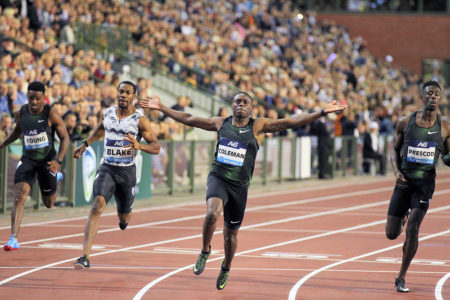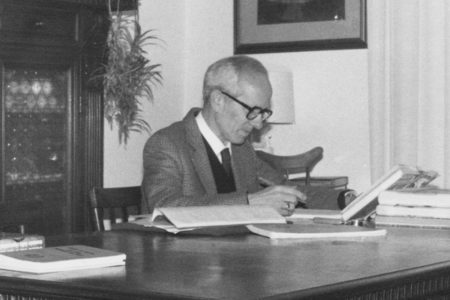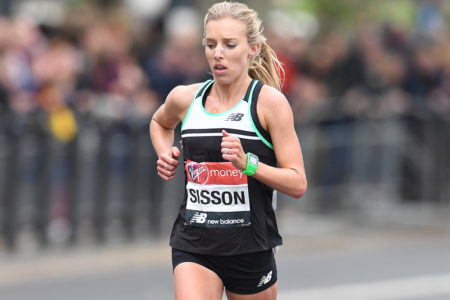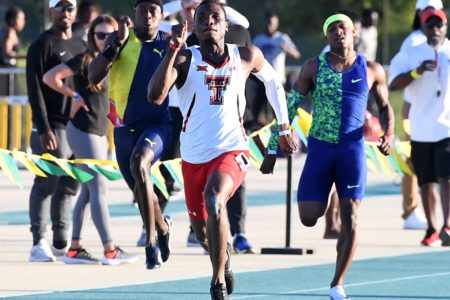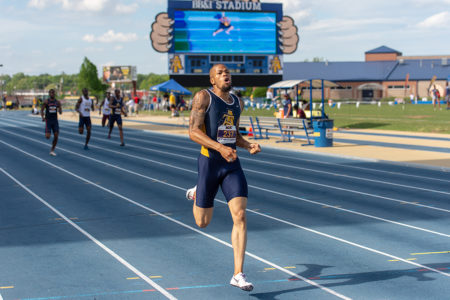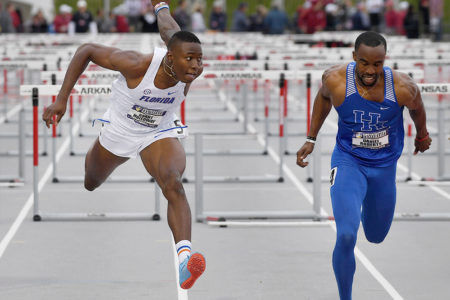
KAYLA WHITE set the MEAC meet on fire. After producing 22.62w and a PR 11.16 in the heats, no one but the athletes and coaches wearing the blue & gold of North Carolina A&T really expected what would come next. The wind blowing a gentle 1.5 for the 100 final, White burst out of her blocks in lane 5 and rocketed down the track in 10.96, a yearly world leader that tied the Aggie senior for No. 5 all-time among collegians.
“I wouldn’t say it surprised me, because that was definitely what I was working for, but it felt good to finally achieve it,” says the 22-year-old speedster, who over the winter won the NCAA Indoor 200 and very nearly captured the hurdles. “I didn’t have the best start, but I still ran 10.9, so it was fine. If I just perfect what I need to perfect, there’s no telling what I can do.”
The men’s century final came next. A&T senior Rodney Rowe, who before this year was better known as a 200 specialist, drilled a 10.05 PR to win by 0.10. Says Rowe, “I knew from the beginning I had to get my start right. We worked on it a lot this off-season. I knew if I put it together, I’d be going pretty fast.”
Not long after that, White took down her PR at double the distance, clocking a U.S.-leading 22.52, with frosh teammates Cambrea Sturgis (22.62) and Kamaya Debose-Epps (23.14) completing the sweep with lifetime bests of their own.
Then Rowe took to the track again, cruising a PR 20.12 for the win, with teammates Akeem Sirleaf (20.37 PR) and Trevor Stewart (20.51) in 3rd and 4th.
Earlier in the day, Stewart and Sirleaf had gone 1-2 in the 400, Stewart’s 44.38 PR taking the yearly U.S. lead. Sirleaf’s 45.42 was also a lifetime best, not to mention a national record for the Minnesota-raised Liberian.

The Aggies have a point to prove. Says coach Duane Ross, himself an ’04 Olympian in the 110H, “When I took over here, they said, ‘You can’t win at an HBCU.’ I heard it so many times. And while we don’t have the same resources that some of these Power 5 conferences have, I stressed to my kids since Day 1, it’s not all about that. I tell them, ‘You bring the discipline and the focus, I’ll bring the plan, we’ll depend on each other and we’ll get it done.’ And that’s what we do.” Talking to Mike Holloway after the MEAC win, Ross says the Florida coach congratulated him by saying, ‘You and that team have figured it out. You figured out that it doesn’t matter what logo is on your chest.’ ”
None of the speedsters making headlines were prep All-Americas. None of them came from the islands. Homegrown talent. Take White, for instance. She spent more time dancing than sprinting when she was younger. She finally started taking track seriously as a senior at Southridge High in Miami, specializing in the hurdles, where she clocked 13.88 after finishing 3rd in Florida’s 4A Champs. As an A&T frosh she sprinted 11.52 and hurdled 13.37 then improved to 11.39/12.94 as a soph and 11.21/12.92 last year.
“Some of my competition has been running track since they were five years old,” she says. “They know the ins and outs and they have a lot more experience compared to me. “I just started in high school, but I feel like I developed really well. Every year I got better. So even though I came into the game a little late, I’m where I need to be right now.” And after missing the NCAA Indoor win in the hurdles by a mere 0.02, White is stepping away from that event. “It’s bittersweet,” she says, “but I consider myself a sprinter now. The hurdles? We have enough depth in the USA for that. The sprints as well, but I feel like that’s where I can produce faster times.”
Taking White out of the hurdles had serious conference implications. Ross points out that last year the Aggies lost the team title by a half point. So when he made the decision to let her concentrate on the sprints, he announced it at a team meeting. “I was like, ‘She’s always been about team. This is about her future. I’m deciding that she’s just going to run the 100 and 200 now. She’s not going to hurdle. That means you guys have to step up and carry that weight.’ And the hurdlers looked at Kayla and said, ‘Kayla, we got you.’ And they did.” Led by junior Madeleine Akobundu (12.81), they swept the event, with Te’Jyrica Robinson (12.98) and Paula Salmon (13.35) joining in, all with PRs.
Stewart ran 46.44 as a Virginia prep. Now he’s at 44.38, but a timing error in the prelims might have cost him a faster time; a sensor problem led to officials using a back-up hand time, to which a conversion factor was added for a “44.40” total. “I was a little disappointed,” says Ross. “But Trevor looked at me and said, ‘Don’t worry coach. I’m doing the same thing tomorrow.’ And he did.”
Rowe, 22, was just a 10.53 sprinter at Clayton High School, 90M down the road from Greensboro. For most of his college career he made his biggest impact as a 200 guy (5th in the NCAA last year after earlier running a PR 20.27). But with 9.93 man Christopher Belcher graduating in ’17, Rowe has been called on to step up in the century. Last year he improved to 10.22. Now he’s run consecutive PRs of 10.10 and 10.05. “There’s a lot more there,” he says. “I didn’t have the best start I could have had. So I feel like the ceiling is endless. I just have to stay focused, keep putting in the work and we’ll see where it takes me.”
Says Ross, “I told him, ‘We need to really bear down and make this 100 work because you’re better than 10.2. I think you’re a sub-10 sprinter and you need to believe that and you need to get to work on it.’ When he steps on a track, I’m not guessing what he’s going to run. What he gives you in practices is normally what he’s going to give you in a competition. He’s a hard worker and he’s a gamer. When those lights come on, he’s the one who turns it on.”
Now the team is focused on the Regionals and Nationals. “That’s the game,” says Ross. “That’s what we trained for. That’s where everybody’s going to show up.”
